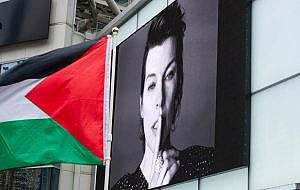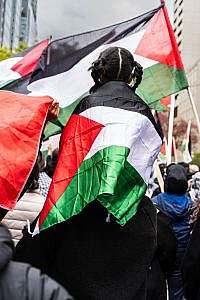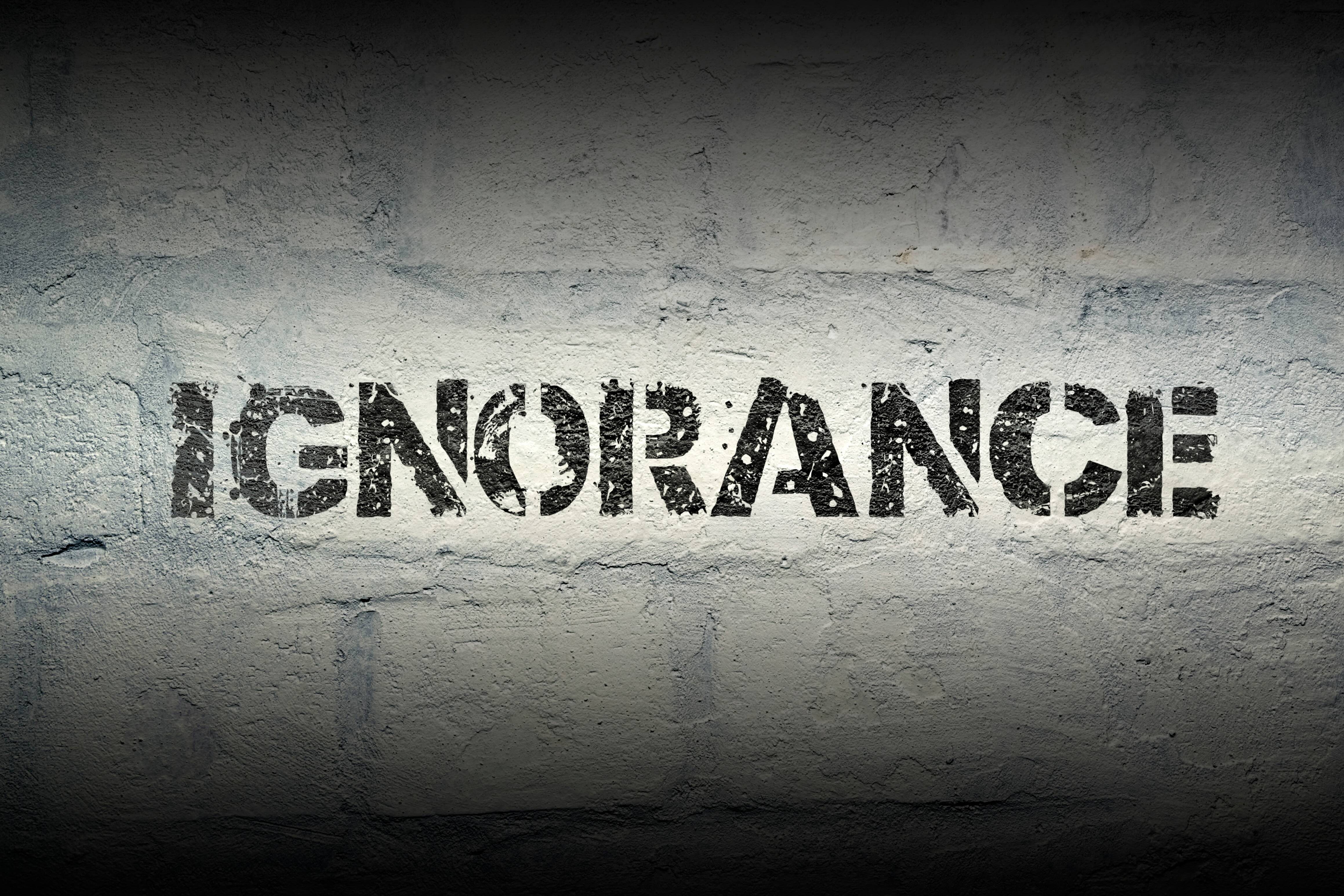“No Other Land” and the politics of hypocrisy
Basel Adra has lived in the West Bank Palestinian community of Masafer Yatta all his life. Like his father before him, he has struggled against the implacable force of Israeli soldiers who as a matter of routine, fence off grazing lands, destroy houses and sheds, cut off water and arrest villagers, furious at seeing their homes eaten by bulldozers and backhoes. Basel comes across an Israeli journalist, Yuval Abraham a man about the same age and over several years the two of them document the steady dispossession of the people of Masafer Yatta. The conversations they have over the years are frank and pointed, though surprisingly, not bitter. The relationship between the two produced an Academy Award winning documentary, “No Other Land.”
The differences in worlds the two young men inhabit couldn’t be more starkly defined. Yuval, unlike Basel is able to come and go as he pleases with his yellow Israeli license plates. Basel and his neighbours watch with outraged impotence, as the Israeli district manager points out which houses will be emptied and demolished on any given day. An angry villager who pushes back at one of the soldiers keeping the rest of them at bay, is shot and paralyzed from the neck down. Because the residents of Masafer Yatta just won’t pick up and leave their homes, one day a cement truck comes by and fills the local well with a load of concrete, shutting off the water supply for good. Towards the end of the documentary, a school built by villagers, is razed. Settlers attack the village and Basel’s cousin is shot and killed. As Basel says: ”this is a story about power.”
But it’s not a story that students may see in Ontario schools because its content is controversial, whatever the Ministry of Education decides that means.
Difference in priorities
At Toronto DSB’s Central Toronto Academy, the school’s Jewish Student Alliance was permitted to attend the Nova Exhibit which memorializes Israeli people at the Nova Music festival during the October 7, 2023 assault by Hamas which slaughtered 1 200 people and took another 250 hostage.
But when the school’s Muslim Student Alliance asked to screen “No Other Land,” the request was turned down by school and board administration. A letter to local trustee Deborah Williams, signed by 250 parents and community members, received support, but in the end the TDSB decided not to allow screening of the film or any other political activities, though that direction came after the Nova Exhibit. Ryan Bird, the Board’s Communications Executive Officer told me: “The Israeli-Palestinian conflict is a complex geopolitical issue and given the Minister of Education’s direction to school boards to avoid politics in the classroom, the screening of this film was not approved. Central direction was provided after the initial excursion you reference.”
 What could the Minister mean? How do you avoid “politics in the classroom” when politics surrounds the students in it? Premier Doug Ford couldn’t have made that point clearer when he chastised teachers for taking students to the Grassy Narrows’ First Nation River Run last September: “It’s disgraceful,” he ranted. “You’re trying to indoctrinate our kids. They should be in the classroom learning about reading, writing, spelling, arithmetic, the whole shebang, but instead, the TDSB and these teachers want to bring them down to a rally, a Palestinian rally, and it’s ridiculous.” He knew better; Ford was preaching to his choir of Israeli settlement supporters.
What could the Minister mean? How do you avoid “politics in the classroom” when politics surrounds the students in it? Premier Doug Ford couldn’t have made that point clearer when he chastised teachers for taking students to the Grassy Narrows’ First Nation River Run last September: “It’s disgraceful,” he ranted. “You’re trying to indoctrinate our kids. They should be in the classroom learning about reading, writing, spelling, arithmetic, the whole shebang, but instead, the TDSB and these teachers want to bring them down to a rally, a Palestinian rally, and it’s ridiculous.” He knew better; Ford was preaching to his choir of Israeli settlement supporters.
When asked for a comment about the refusal to show “No Other Land” Education Minister Paul Calandra’s press secretary Emma Testani reiterated Ford’s 3Rs comment on education to the Toronto Star: “Schools should be focused on educating students and helping them graduate with strong reading, writing and math skills that lead to good-paying jobs.” Strong skills should also lead to critical thinking, questioning what politicians say and being engaged citizens. But that seems to have been left out of the Ministry’s reckoning.
Prescribed ignorance
If Doug Ford had an education mantra, this would be it: Three R’s and get a job. We hear it over and over. It underlies cuts in education, backlogs in service for children on the autism spectrum, little money to counter the huge needs of students who learn differently, cuts to any so-called extras that might be offered to young people by school boards. All you need are the basics. But in this case, it underscores something that threatens to become fundamental in education: officially prescribed ignorance.
Author Henry Giroux has written a lot about this phenomenon, recently describing Donald Trump’s attacks on education as a “cornerstone of an authoritarian ideology designed to eliminate critical thought, suppress historical truth, and strip educators of their autonomy.”
Giroux’s point applies to the repressive and arbitrary nature of the Ford government’s direction on politics in the classroom. The TDSB couldn’t provide any guidelines about showing a possibly controversial documentary like “No Other Land.” There were no ministry Policy/Programme Memorandums about it. There was nothing in the Provincial Code of Conduct that might be applicable, other than a rule that no one may engage in hate propaganda or other behaviour motivated by hate or bias. Ministry communications staff didn’t respond to my questions about whether or not Testani’s statement described a policy or someone’s opinion and if teachers were indeed permitted to discuss geopolitical issues in the classroom – even without bias intended.
Nonetheless, it has had its intended chilling effect: avoid politics in the classroom.
That is ridiculous. Any critical discussion teachers lead in their classrooms beyond “3Rs and get a job” could easily be political. Does a teacher say to their class: “Sorry we can’t discuss the Russian war against the Ukraine; it’s complex and geopolitical.” “We can’t talk about the rise of China as an economic power; that might upset the Americans who believe their economic hegemony is unending.” It rules out literature that might be connected to historical, social and/or economic conditions which, of course are political and probably controversial.
Closer to home, avoiding politics in the classroom begs questions about whether or not to talk about LGBTQ2S+ related issues, antisemitism, Islamophobia, anti-Asian bias, anti-Black racism or the histories of Indigenous peoples to name a few. The list is long. Are there to be no documentaries shown about the lives of these people? Are we to ignore them, despite the possibility that shedding light might be controversial; might be political?
Those questions have a clear answer in Donald Trump’s America. Get rid of Diversity, Equity and Inclusion (DEI) wherever it rears its head. Make history about greatness again.
Bias is direction from the Ford government
As TDSB Chair Neethan Shan explained last fall: “Geopolitical conflicts are not necessarily things that are just happening somewhere far away — they have real consequences on many families in our system. “There’s pain, there’s struggle and they’re trying to heal. And when they come to school … we need educators to have the necessary training, tools, resources to be able to affirm the different identities and be supportive of students in a way that is not exclusive to one community.”
 So, what does the Ford government offer educators by way of guidance in dealing with these consequences? Other than an admonition from former Education Minister, Jill Dunlop last October to keep biases out of the classroom, it’s been politics. On the anniversary of the Hamas attack, Ford condemned the “horrific and antisemitic terrorist attack against Israelis, which resulted in the murder of nearly 1,200 people and the kidnapping of hundreds more.” Last spring, he called for pro-Palestinian university encampments to be taken away. In the Ontario Legislature he stated as fact that Hamas uses Palestinians as human shields, something claimed -without support- by Israel. A Tory motion condemned former NDP MPP Sara Jama’s comments calling for a ceasefire in Gaza and an end to occupation of Palestinian land calling it “antisemitic” and “discriminatory.”
So, what does the Ford government offer educators by way of guidance in dealing with these consequences? Other than an admonition from former Education Minister, Jill Dunlop last October to keep biases out of the classroom, it’s been politics. On the anniversary of the Hamas attack, Ford condemned the “horrific and antisemitic terrorist attack against Israelis, which resulted in the murder of nearly 1,200 people and the kidnapping of hundreds more.” Last spring, he called for pro-Palestinian university encampments to be taken away. In the Ontario Legislature he stated as fact that Hamas uses Palestinians as human shields, something claimed -without support- by Israel. A Tory motion condemned former NDP MPP Sara Jama’s comments calling for a ceasefire in Gaza and an end to occupation of Palestinian land calling it “antisemitic” and “discriminatory.”
And yet there’s silence from Ford and those marching to his tune about the genocide underway in Gaza, over 55 000 people put to death, starved, purposefully deprived of food or medical aid or killed when they go to seek it. This in itself, embodies a political direction to schools about what the government that funds them expects as far as toeing its ideological line is concerned.
Bias and the TDSB
Even the TDSB, proud of its focus on DEI doesn’t avoid politics in the classroom when it comes to dealing with Israel and Palestine. The Board worked with the TDSB Jewish Heritage Committee to update its Affirming Jewish Identities and Addressing Antisemitism and the Combatting Hate and Racism Strategy. That committee has its own page on the TDSB website which links to the Anti-Defamation League’s (ADL) page Discussing the Israel-Hamas War With Young People.
The ADL says that one of its jobs is to “educate and engage on how harsh expressions about the Jewish state and Zionism can be antisemitic.” It is hardly in a position to be educating students about the ”Israeli-Palestinian Conflict” referring to decades of misery as some sort of disagreement. It mentions nothing about the lives of Palestinians in that so-called conflict, nothing about how many of them have been killed in both Gaza and the West Bank at the hands of the Israeli military and in many cases, settlers. Rather it warns teachers about “recognizing bias when Israel is in the headlines.”
The TDSB is fearful of trouble from both the Ford government and those who conflate criticism of Israel with antisemitism. Just a few days ago students walked out of the west end academy, that bears the name of physicist, feminist and social activist Ursula Franklin. They’d learned that a picture of two grade 12 students wearing keffiyehs had been covered over by a sticker in a crude effort to avoid offence, though the principal, Petal Farquharson explained it was due to a misprint. The TDSB later admitted to the Toronto Star that the cover up was in line with the Ministry’s direction on politics in the classroom. Here, it was students leading the way by standing up for honesty and courage.
This brings me back to “No Other Land.” Like every good documentary, it simply shows the lives of the people living in Masafer Yatta. It doesn’t portray them as victims or vilify the Israelis destroying their homes and school. You can draw your own conclusions about that. No doubt, some critics will say it doesn’t show the right events, that it is biased. That is history; that is news. But banning “No Other Land” is hypocrisy in the service of ignorance.


